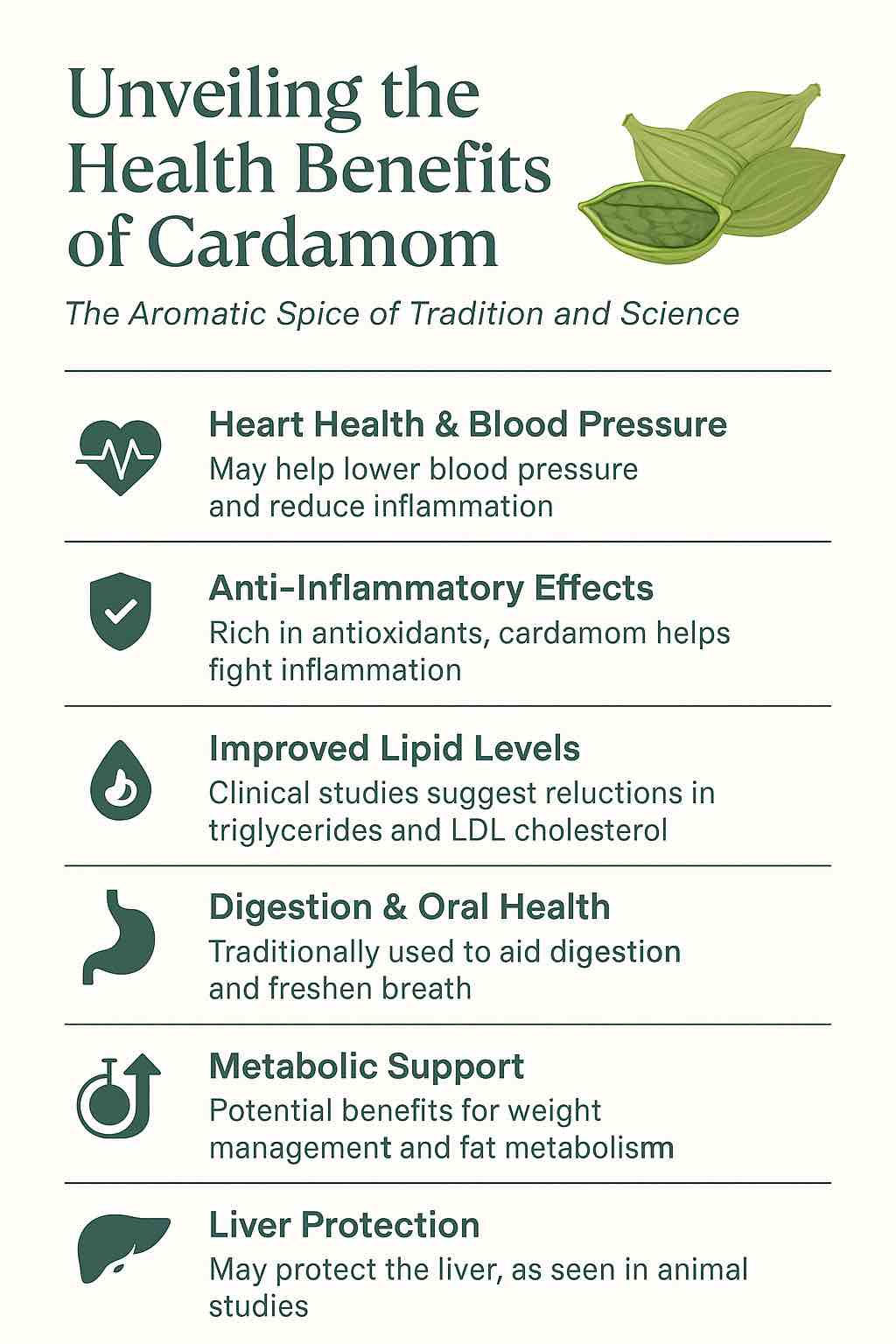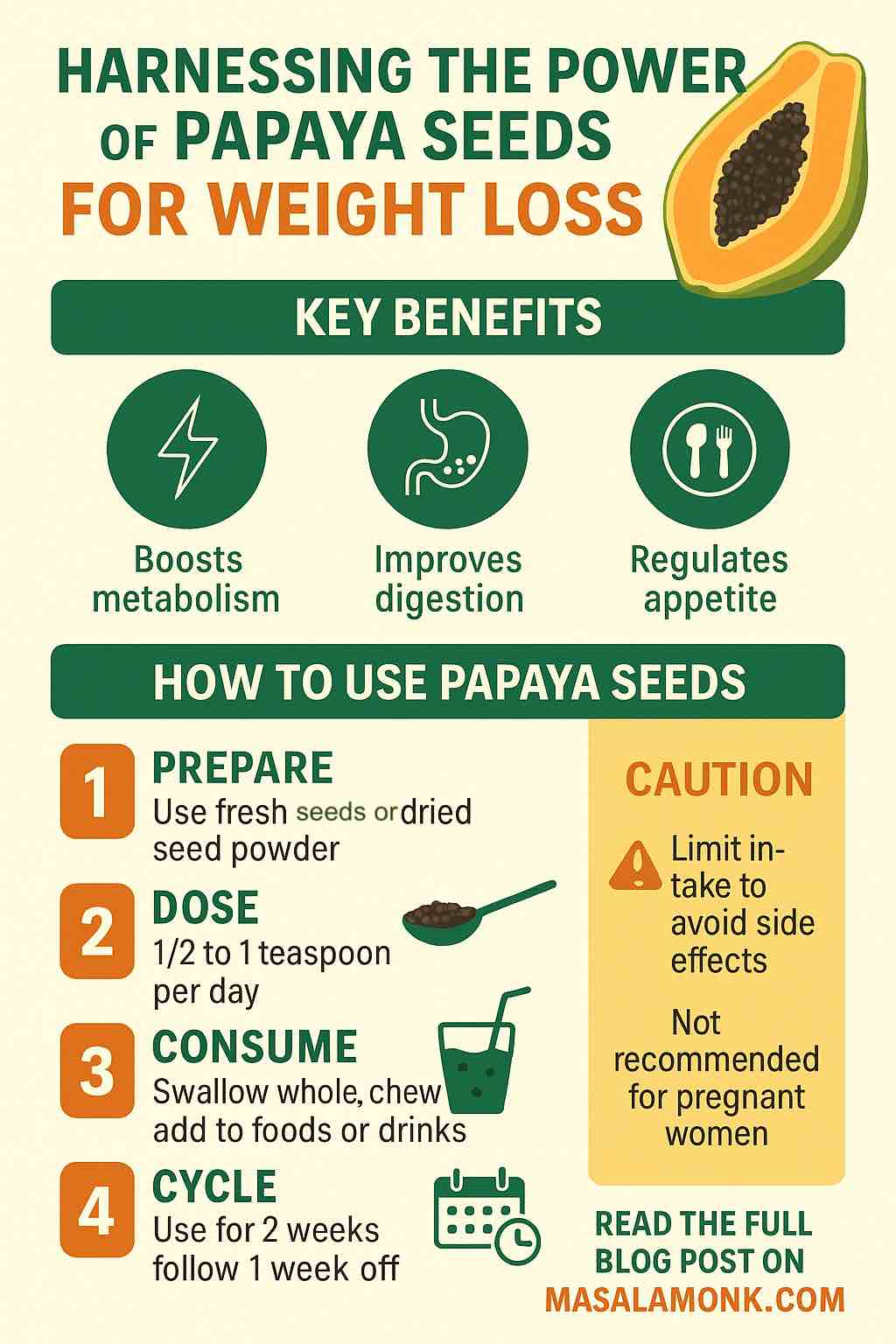
Cardamom isn’t just a fragrant addition to your chai or biryani—this ancient spice is undergoing a scientific renaissance. Long prized in traditional medicine from Ayurveda to Traditional Chinese Medicine, modern clinical trials are now validating what healers knew centuries ago: cardamom has real, measurable benefits for your body and brain.
In this post, we’ll unpack the latest 2023–2025 research on cardamom’s health benefits, what makes it work, and how to use it for the best results—without overhyping or going off the evidence rails.
🌱 What Is Cardamom, Really?
Cardamom comes from the seeds of plants in the Zingiberaceae (ginger) family. There are two primary varieties:
- Green cardamom (Elettaria cardamomum): Common in Indian cooking and sweet dishes.
- Black cardamom (Amomum subulatum): Smokier, used more in savory dishes and Chinese medicine.
The seeds and pods contain essential oils and antioxidant compounds like:
- 1,8-cineole (eucalyptol)
- Terpinene
- Linalool
- Flavonoids and phenolic acids
These natural compounds are what give cardamom its powerful anti-inflammatory, antioxidant, and metabolic effects.
🫀 1. Heart Health & Blood Pressure: Tiny Seeds, Big Impact
✅ What the Science Says:
A 2023 meta-analysis of 8 randomized clinical trials found that cardamom supplementation led to modest but statistically significant reductions in:
- Systolic BP (avg. ~0.54 mmHg)
- Diastolic BP (avg. ~0.90 mmHg)
- hs‑CRP, IL-6, and TNF-α (key inflammatory markers)
One standout trial involved people with stage‑1 hypertension who took 3g/day for 12 weeks. Results:
- Systolic BP dropped from 154 → 135 mmHg
- Antioxidant enzymes (SOD, glutathione) increased significantly
🧠 Mechanism of Action:
Cardamom seems to work by enhancing nitric oxide release (a natural vasodilator), and modulating calcium channels, leading to relaxed blood vessels and lowered pressure.
💡 Practical Takeaway:
If you’re managing mild hypertension or metabolic syndrome, adding 1.5–3g/day of ground cardamom to your meals or tea may offer modest support.
🧬 2. Anti-Inflammatory & Antioxidant Power
🔬 Why It Matters:
Chronic inflammation is the hidden driver behind many modern diseases—from type 2 diabetes to heart disease. Cardamom’s oils act as natural COX-2 and iNOS inhibitors, reducing inflammatory pathways.
In clinical trials and lab studies, cardamom:
- Reduces oxidative stress markers (MDA, 8-isoprostane)
- Lowers pro-inflammatory cytokines (TNF-α, IL-6)
- Increases cellular antioxidant defense (glutathione, SOD)
🧪 Real-World Uses:
- Joint stiffness? Add cardamom-infused tea to your morning routine.
- Inflamed gut? Try cardamom powder in warm milk before bed.
💉 3. Metabolic Benefits: Lipids, Liver & Blood Sugar
✅ Lipid Improvements:
In studies spanning 8–12 weeks:
- Triglycerides dropped by 15–30 mg/dL
- LDL cholesterol reduced
- HDL showed slight improvement
These effects are strongest in people with obesity, NAFLD (non-alcoholic fatty liver disease), or insulin resistance.
🩺 Liver Health:
A 2025 study published in Scientific Reports showed that cardamom extract protected rats from tamoxifen-induced liver damage, by:
- Reducing pyroptosis (inflammatory cell death)
- Enhancing antioxidant enzyme expression
While human liver trials are pending, the mechanisms look strong.
⚖️ 4. Weight Management & Appetite Support
A 2023 Texas A&M study found that mice consuming cardamom:
- Burned more fat
- Had increased energy expenditure
- Ate more but gained less weight
Mechanistically, cardamom seems to activate neuroendocrine pathways that regulate metabolism in fat and muscle tissues.
👀 Important Caveat:
These results are preclinical—human trials are needed. But they suggest cardamom could become part of a weight loss support plan, especially when combined with healthy eating.
🦷 5. Oral & Digestive Benefits
Cardamom contains oils that:
- Kill bacteria like Streptococcus mutans (linked to tooth decay)
- Help reduce bad breath
- Soothe the stomach and aid digestion
Anecdotally and historically, cardamom has been used to:
- Relieve bloating
- Ease nausea and gas
- Reduce acid reflux symptoms
🛡️ 6. Other Potential Benefits (Emerging Evidence)
- Anticancer support: Lab studies show cardamom can inhibit tumor growth via apoptosis and oxidative stress reduction.
- Antimicrobial activity: Active against certain fungi and bacteria, including strains resistant to antibiotics.
- Mood support: Traditional use suggests mild anxiolytic effects, possibly from its aroma and nervine tonics, though human data are sparse.
💊 How to Use Cardamom Effectively
| Form | Dose Range | Notes |
|---|---|---|
| Whole pods | 2–5 pods/day | Steep in tea, chew after meals, or cook with |
| Ground powder | 1.5–3g/day | Stir into coffee, smoothies, or milk |
| Capsules | 500–1000mg x2/day | Check for standardized extracts |
| Essential oil | Topical/aroma | Use with caution; not for internal use |
⚠️ Safety, Side Effects, and Interactions
- Generally recognized as safe (GRAS) by FDA
- Mild side effects: GI upset, skin rash (rare)
- Caution with:
- Blood thinners (e.g., warfarin)
- Gallbladder issues
- Pregnancy (use culinary amounts only)
Always consult your healthcare provider before starting any supplement.
🔍 The Bottom Line
Cardamom is more than a flavor booster—it’s a science-backed functional food. With cardiovascular, anti-inflammatory, metabolic, and digestive benefits, this spice deserves a regular spot in your kitchen and possibly your supplement shelf.
Key Points to Remember:
- Ideal dosage: 1.5–3g/day for general health
- Best used consistently over 8+ weeks
- Combine with a healthy diet, not as a miracle fix
- Watch for upcoming human studies on liver health, fat metabolism, and cognitive support
☕ 3 Easy Ways to Add Cardamom to Your Life
- Cardamom Tea: Boil crushed pods in water for 5–7 minutes; add milk and honey if desired.
- Golden Milk Boost: Stir ¼ tsp cardamom + ½ tsp turmeric into warm almond milk.
- Smoothie Spice: Add ½ tsp cardamom powder to morning smoothies with banana, oats, and almond butter.
✨ Final Thoughts
In a world of wellness fads, cardamom stands out for its combination of tradition and science. Whether you’re managing inflammation, improving heart health, or just love the taste, this aromatic spice has the credentials to back up its reputation.
So the next time you reach for your spice rack, know that those little green pods are carrying big health potential.
📚 Frequently Asked Questions (FAQs)
1. How much cardamom should I consume daily for health benefits?
Most studies suggest 1.5–3 grams per day of ground cardamom (around 4–8 green pods) is effective and safe. This can be consumed via tea, food, or in capsule form.
2. Can cardamom lower blood pressure naturally?
Yes, several human studies show that cardamom can modestly reduce both systolic and diastolic blood pressure, especially in people with stage-1 hypertension, likely due to its vasodilatory and anti-inflammatory properties.
3. Does cardamom help with weight loss?
Early research (mostly in animals) shows that cardamom may increase fat burning and energy expenditure, but human evidence is limited. It’s best used as a supportive spice, not a standalone fat-burner.
4. Is cardamom good for digestion?
Absolutely. Cardamom has been traditionally used to relieve bloating, gas, indigestion, and nausea. It also helps relax the stomach lining and stimulates bile flow.
5. Can I take cardamom if I’m pregnant or breastfeeding?
Cardamom in culinary amounts is generally safe, but avoid supplements or high doses unless approved by a healthcare provider due to a lack of safety data during pregnancy.
6. What’s the best way to take cardamom for health purposes?
The most effective and sustainable way is daily culinary use—add it to tea, smoothies, oatmeal, or rice dishes. Capsules (500–1000 mg twice daily) are also available for more targeted supplementation.
7. Does cardamom interact with medications?
Cardamom may enhance the effects of blood thinners and could affect gallbladder conditions. If you’re on medications, consult a doctor before supplementing.
8. Can cardamom improve cholesterol levels?
Yes, in studies, cardamom helped reduce triglycerides and LDL levels while slightly increasing HDL cholesterol, especially in people with metabolic syndrome or fatty liver.
9. Is cardamom safe for daily consumption?
Yes, cardamom is considered safe for long-term daily use at typical food or supplement doses (≤3 g/day). Rare side effects may include mild digestive upset or allergic reactions.
10. How long does it take to see results from using cardamom?
Most clinical trials observed benefits after 8 to 12 weeks of consistent use. Daily intake, even in small amounts, is key for results in blood pressure, digestion, or inflammation.













